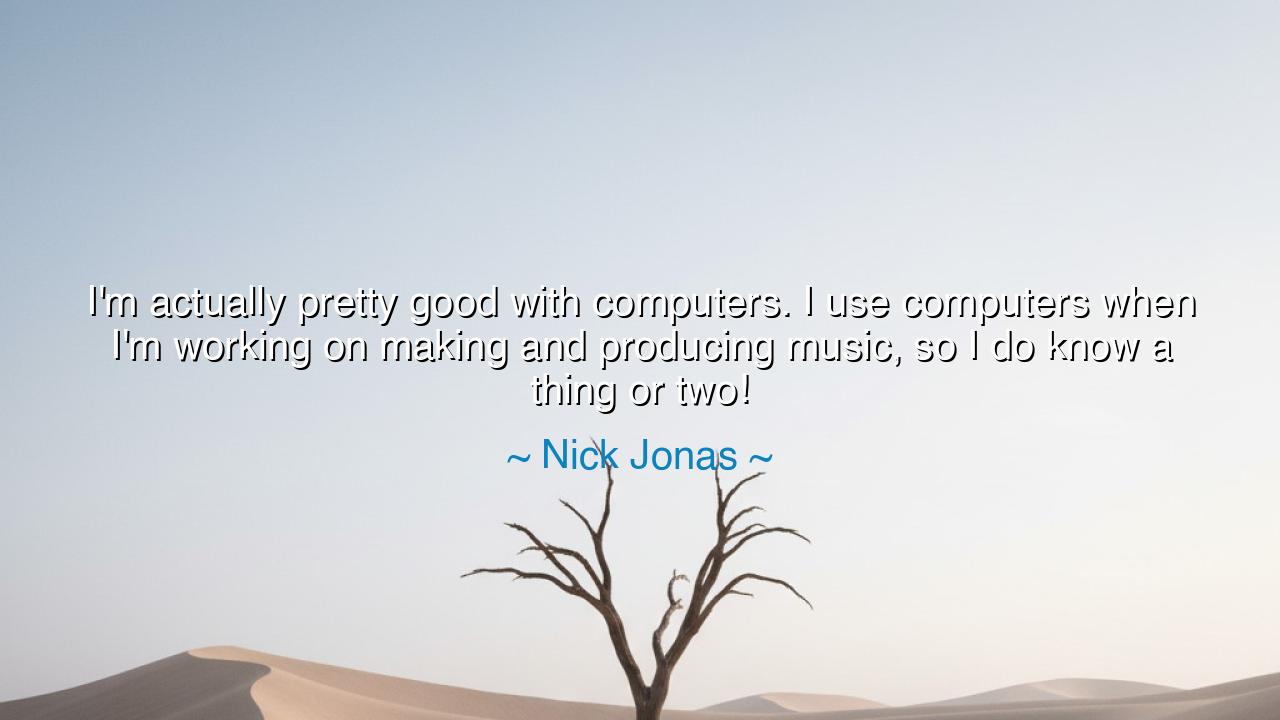
I'm actually pretty good with computers. I use computers when I'm
I'm actually pretty good with computers. I use computers when I'm working on making and producing music, so I do know a thing or two!






Listen, O children of the earth, to the words of Nick Jonas, who speaks not only with confidence, but with an acknowledgment of the changing times: "I'm actually pretty good with computers. I use computers when I'm working on making and producing music, so I do know a thing or two!" These words, simple as they may seem, reflect a profound truth about adaptation, growth, and the ever-evolving role of technology in human life. In an age where the tools of creation have transformed, Jonas’ statement is a reminder that knowledge and skill are not fixed, but must evolve with the times.
In the days of the ancient world, creation was closely tied to physical effort. The great artists of old, whether they were sculptors, painters, or musicians, relied on the tools of their trade—chisels, brushes, and instruments—to bring their visions to life. But as time passed, the tools of creation changed, and the need for adaptation grew. The philosophers and inventors of ancient civilizations understood that true mastery lay in the ability to adapt, to embrace new tools, and to use them in service of their vision. In this, Jonas’ words are a testament to the modern age, where the computer has become a vital tool for creating and producing music—just as the chisel was once the tool for sculpting masterpieces.
Think of the story of Leonardo da Vinci, whose genius spanned the worlds of art, engineering, and science. While da Vinci was a master of many disciplines, he was also a man who was deeply attuned to the tools of his time. He did not shy away from the new innovations that emerged but instead integrated them into his work. In fact, his sketches were filled with designs for flying machines, weapons, and robots—ideas that were ahead of his time. Da Vinci’s brilliance was not limited to his talent with paint or pencils; it lay in his ability to embrace new ideas and tools, understanding that the future of creation would always be shaped by the innovations that came before it.
Similarly, Jonas' statement reflects the truth that mastery in the modern world is no longer confined to traditional tools. The computer has become the instrument through which music and art are created, a tool that allows artists to not only compose but also to shape sound in ways that were once unimaginable. In the past, musicians had to rely on the physical limits of their instruments—strings, keys, drums—but today, a vast array of digital tools exists at their fingertips. Jonas, like so many other modern creators, has embraced this evolution, recognizing that the computer is not just a tool for work, but an instrument of expression in itself.
The lesson here, O children of the earth, is one of adaptation and embracing change. Just as the great artists of the past were not afraid to evolve with the tools of their time, so must we adapt to the ever-changing landscape of technology and creation. Jonas’ words remind us that it is not enough to master the tools of yesterday; we must also be willing to learn and grow with the tools of today, whether they be computers, digital software, or any other invention that shapes the world of creation. The world changes, and so must we. To remain stagnant is to miss the opportunity to create, to innovate, and to move forward.
Consider the example of the printing press in the 15th century. Before its invention, books were copied by hand, a laborious process that limited the spread of knowledge. Yet, when Johannes Gutenberg introduced the printing press, a new world of possibilities opened. The press was not just a tool—it was a revolution, allowing the ideas of great thinkers to spread rapidly and change the world. Just as the printing press changed the course of history, the computer has similarly revolutionized the way we create, connect, and communicate. Jonas and others who embrace the tools of their time do so not out of necessity, but out of recognition that mastery of these tools allows them to shape the future.
In your own lives, O seekers of wisdom, do not fear the new tools that come with the changing world. Embrace the opportunities they provide, and use them to express your creativity, your knowledge, and your vision. Just as the great minds of history did not resist the innovations of their time but instead used them to expand their reach, so too should you use the tools available to you today to create and grow. Remember that mastery lies not in the tools themselves, but in your ability to use them in service of your purpose. Let the computer, like the brush or the chisel before it, become an instrument of your creativity, and let it propel you to new heights of expression and invention.






AAdministratorAdministrator
Welcome, honored guests. Please leave a comment, we will respond soon